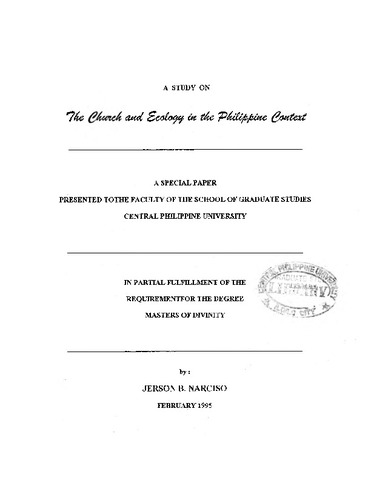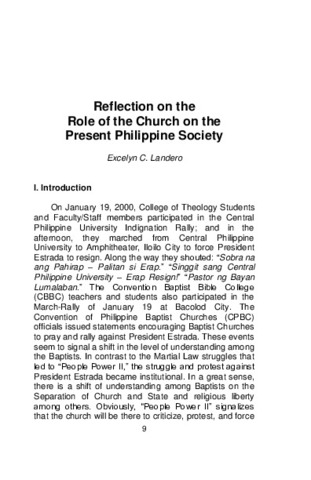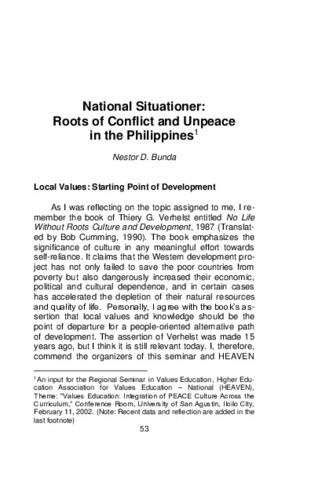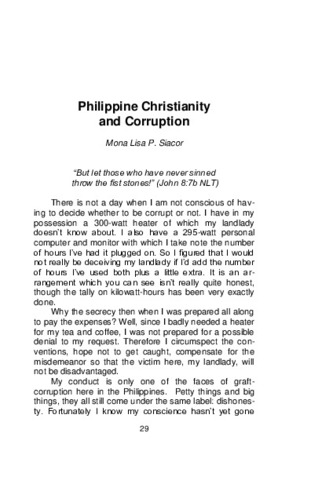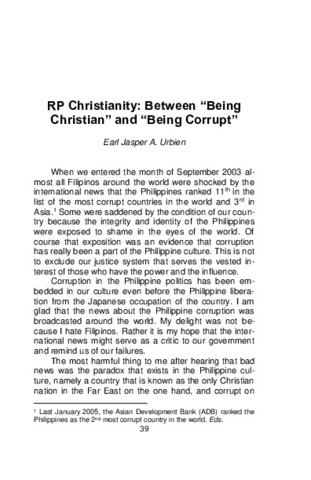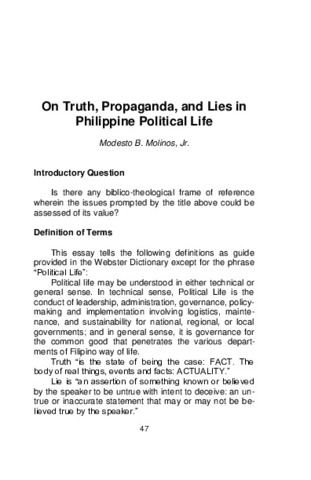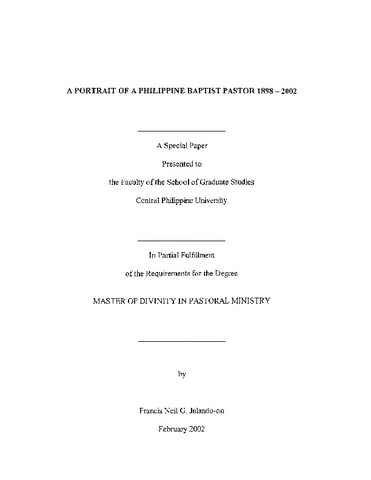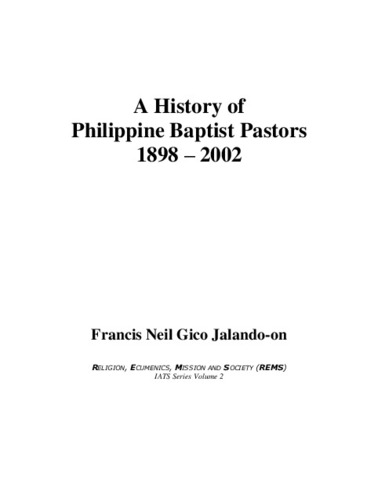Search
Now showing items 1-10 of 14
A study on the church and ecology in the Philippine context
(1995)
The problem of environmental degradation is not anymore an isolated issue. This is now a global concern. People all over the world are very much aware of the seriousness of this problem. Locally and worldwide people are ...
The role of the Church on the present Philippine society
(Institute of Advanced Theological Studies (IATS) and College of Theology, 2005)
On January 19, 2000, College of Theology Students and Faculty/Staff members participated in the Central Philippine University Indignation Rally; and in the afternoon, they marched from Central Philippine University to Amphitheater, Iloilo City to force President Estrada to resign. Along the way they shouted: “Sobra na ang Pahirap – Palitan si Erap.” “Singgit sang Central Philippine University – Erap Resign!” “Pastor ng Bayan Lumalaban.” The Convention Baptist Bible College (CBBC) teachers and students also participated in the March-Rally of January 19 at Bacolod City. The Convention of Philippine Baptist Churches (CPBC) officials issued statements encouraging Baptist Churches to pray and rally against President Estrada. These events seem to signal a shift in the level of understanding among the Baptists. In contrast to the Martial Law struggles that led to “People Power II,” the struggle and protest against President Estrada became institutional. In a great sense, there is a shift of understanding among Baptists on the Separation of Church and State and religious liberty among others. Obviously, "People Power II” signalizes that the church will be there to criticize, protest, and force corrupt government officials to perform well otherwise they will be forced to resign or to be ousted by the people including the church.
This paper will attempt to find out the Role of the Church in the present Philippine Society specifically on the concept of the church, on the principles relating to the separation of the Church and society on the response of church’s own understanding of its existence, and the writer’s Theological Reflection....
The confrontation of the Roman Catholic church with the economic and social development in the Philippines in relation to the influence of the socio-theological position of the II Vatican council : Approaches and resources
(1974)
The historic visit of Pope Paul VI to Asia, particularly the Philippines, in November 1970, focused the attention of the Catholic world on the R.C. Church in the Philippines. For her and the majority of Filipino Catholics, ...
National situationer: Roots of conflict and unpeace in the Philippines
(Institute of Advanced Theological Studies (IATS) and College of Theology, 2005)
Our topic, National Situationer: Roots of Conflict and Unpeace in the Philippines clearly asserts in itself (which I hope all of us can agree) the presence of conflict and unpeace (and it is not saying directly whether ...
Philippine Christianity and corruption
(Institute of Advanced Theological Studies (IATS) and College of Theology, 2005)
There are many instances when I have seen corruption to pay, the culprits getting away with their conduct and somehow gaining by it. No matter that they have committed an immorality, just as long as some cost has been cut, ...
R.P. Christianity: “Being Christian” and “being corrupt”
(Institute of Advanced Theological Studies (IATS) and College of Theology, 2005)
When we entered the month of September 2003 almost all Filipinos around the world were shocked by the international news that the Philippines ranked 11th in the list of the most corrupt countries in the world and 3rd in ...
On truth, propaganda, and lies in Philippine politics
(Institute of Advanced Theological Studies (IATS) and College of Theology, 2005)
Is there any biblico-theological frame of reference wherein the issues prompted by the title above could be assessed of its value?
The concept of “Eirene” in John 14:27-31 and its implications to the peace agenda between the Government of the Republic of the Philippines (GRP) and the National Democratic Front (NDF)
(2006)
This special paper deals with the topic, “The Concept of Eirene in John 14:27- 31 and Its Implications to the Peace Agenda Between the Government of the Republic of the Philippines (GRP) and National Democratic Front (NDF).” ...
A portrait of a Philippine Baptist pastor 1898 - 2002
(2002)
After more than one hundred years of Baptist history in the Philippines there is still a lack of a comprehensive written history on Philippine Baptist pastors focusing on their pastoral identity, their contributions in ...
A history of Philippine Baptist Pastors: 1898 - 2002
(Institute of Advanced Theological Studies, 2003)
"This book hopes to contribute to the writing of the history of the Philippine Baptist pastors from a point of view that emphasizes the Philippine Baptist pastors.
This study aims at reconstructing a history of the Philippine Baptist pastors from the year 1898 to 2002. This reconstruction will find out who they are and highlight their significant contributions to the church and society. Specifically, this study will describe and analyze their pastoral identity vis-à-vis: a) Their theology and understanding of the ministry; b) Their Political and ideological perspective; c) Their Socio-economic status; d) Their reasons why they committed themselves to become pastors; e) And their significant strength and weaknesses that led to their present situation.
This study attempts to portrait an image of Philippine Baptist Pastors (1898-2002) from a kaupod perspective using published and unpublished documents as well as oral testimonies obtained from interviews and questionnaires." -from the Introduction...


